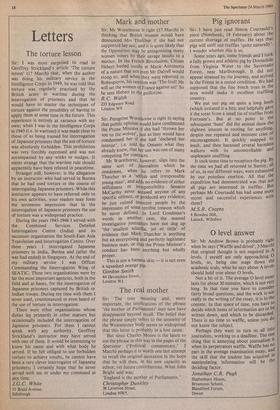Letters
The torture lesson
Sir: I was most surprised to read in Geoffrey Strickland's article 'The torture lesson' (17 March) that, when the author was doing his military service in the Intelligence Corps in 1949, he was told that torture was regularly practised by the British army in wartime during the interrogation of prisoners and that he would have to master the techniques of torture against the possibility of having to apply them at some time in the future. This experience is entirely at variance with my own; when I was in the Intelligence Corps in 1943 (i.e. in wartime) it was made clear to those of us being trained for interrogation of Japanese prisoners that the use of torture was absolutely forbidden. This prohibition was very forcibly expressed and was not accompanied by any winks or nudges. It seems strange that the wartime rule should apparently have been relaxed in peacetime.
Stranger still, however, is the allegation by an instructor who had served in Burma that he had used torture in the course of interrogating Japanese prisoners. While this instructor appears to have referred only to his own activities, your readers may form the erroneous impression that in the interrogation of Japanese prisoners the use of torture was a widespread practice.
During the years 1943-1946 I served with the Combined Services Detailed Interrogation Centre (India) and its successor organisation the South-East Asia Translation and Interrogation Centre. Over these years I interrogated Japanese prisoners in India, Burma and (after the war had ended) in Singapore. At the end of my military service 1 was Officer Commanding the Interrogation Wing of SEATIC. These two organisations were by far the most important agencies, both in the field and at bases, for the interrogation of Japanese prisoners captured by British or Indian troops. During my time with them I never used, countenanced or even heard of the use of torture in interrogation.
There were other organisations whose duties lay primarily in other matters but occasionally included the interrogation of Japanese prisoners. For them I cannot speak with any authority. Geoffrey Strickland's instructor may have served with one of them. It would be interesting to know his name and with what body he served. If he felt obliged to use forbidden torture to achieve results, he cannot have been a very clever interrogator of Japanese prisoners; I certainly hope that he never served with me or under my command at any time.
J.G.C. White
51 Braid Avenue, Edinburgh










































 Previous page
Previous page